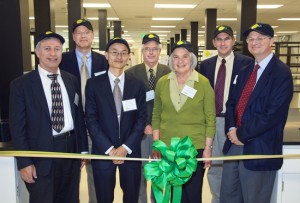
Cutting the ribbon that opened JCAP-North were (from left) Nate Lewis, Eric Rohlfing, Peidong Yang, Heinz Frei, Elaine Chandler, Ed Stolper and Paul Alivisatos.
“We’re here today to celebrate a major milestone for artificial photosynthesis,” said Peidong Yang, director of the Joint Center for Artificial Photosynthesis (JCAP)-North, a facility that was officially opened on June 2, 2011. JCAP-North and its sister facility, JCAP-South in Pasadena, are being funded for up to $122 million over a five year period by the U.S. Department of Energy (DOE) through its “Energy Innovation Hubs” program. The mission of JCAP’s two facilities is to develop a solar-fuel technology modeled off the process by which green plants convert energy from the sun into sugars, but at ten times the efficiency and using low-cost “Earth-abundant” materials. Liquid fuels made from a combination of water, carbon dioxide and sunlight could replace gasoline and other transportation fuels as a domestic source of energy that’s clean, green and renewable.
“JCAP is a very important waypoint on the road to national energy security and economic prosperity,” said Paul Alivisatos, director of the Lawrence Berkeley National Laboratory (Berkeley Lab), which oversees JCAP-North.
Alivisatos was on hand for the ribbon-cutting ceremony that marked the official opening of this new 18,000-square-foot facility. JCAP-North is located in the Aquatic Park section of Berkeley and is expected to house approximately 100 scientists and support staff when fully operational.
The JCAP Energy Innovation Hub is a multi-institutional partnership led by the California Institute of Technology (Caltech) in partnership with Berkeley Lab, under the direction of chemist Nathan Lewis, Caltech’s George L. Argyros Professor, who also heads JCAP-South. JCAP-North is directed by Yang, a distinguished nanochemist who holds joint appointments with Berkeley Lab and the University of California (UC) Berkeley. Other JCAP partners include the SLAC National Accelerator Laboratory at Stanford, and the UC campuses at Santa Barbara, Irvine and San Diego.
Yang has said that from a scientific standpoint the JCAP Energy Innovation Hub is “the opportunity of a lifetime,” because the research could have “a tremendous impact on the future of our society.” JCAP director Lewis, in his remarks at the opening ceremony, said that the JCAP research team has been “charged to do what the Earth needs us to do.”
In a single hour the sun heats the earth with enough energy to power human activities for an entire year. Through photosynthesis, green plants are able to collect solar energy and use it to convert carbon dioxide and water into chemical energy that is stored in sugars and used to carry out the processes of life.
“Since we all think we’re smarter than plants, we should be able to utilize photosynthesis too,” Lewis said.
The idea behind JCAP is to develop an artificial version of photosynthesis through specialized membranes made from nanoengineered materials that can do what green leaves do only much more efficiently and for the purpose of producing fuels for cars and trucks, and possibly for aircraft as well.
Eric Rohlfing, representing DOE’s Office of Science, which is funding JCAP, said that the DOE Energy Innovation Hubs program is one of the “signature initiatives” of President Barack Obama and Energy Secretary Steven Chu. As a major part of that initiative, JCAP therefore carries great expectations.
“We want the ‘J’ in JCAP to stand for Juggernaut,” Rohlfing said.
Also on hand for the JCAP-North opening and ribbon-cutting ceremony were representatives from California State Senator Loni Hancock, and State Assembly members Nancy Skinner and Mary Hayashi, all of whom presented the facility with “certificates of recognition.”
Lewis, Yang and Alivisatos each noted in their remarks that the JCAP proposal received strong support from California political leaders. In addition, the JCAP proposal also received numerous letters of support from environmental and citizen groups.
“Knowing we have the support of our state and local communities has been and will continue to be critical to JCAP’s success,” Lewis said. “DOE has also been behind us from the beginning with incredible support.”
Lawrence Berkeley National Laboratory addresses the world’s most urgent scientific challenges by advancing sustainable energy, protecting human health, creating new materials, and revealing the origin and fate of the universe. Founded in 1931, Berkeley Lab’s scientific expertise has been recognized with 12 Nobel prizes. The University of California manages Berkeley Lab for the U.S. Department of Energy’s Office of Science. For more, visit www.lbl.gov.
Additional Information
For more about JCAP visit the Website at http://solarfuelshub.org/